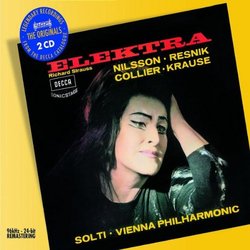| All Artists: Richard [1] Strauss, Georg Solti, Vienna Philharmonic Orchestra, Birgit Nilsson, Felicia Weathers, Gerhard Stolze, Gerhard Unger, Helen Watts, Jane Cook, Leo Heppe, Margaret Sjostedt, Margarita Lilova, Marie Collier, Maureen Lehane, Pauline Tinsley, Regina Resnik, Tugomir Franc, Yvonne Minton Title: Richard Strauss: Elektra Members Wishing: 1 Total Copies: 0 Label: Decca Original Release Date: 1/1/2007 Re-Release Date: 5/8/2007 Genre: Classical Styles: Opera & Classical Vocal, Historical Periods, Modern, 20th, & 21st Century Number of Discs: 2 SwapaCD Credits: 2 UPC: 028947582311 |
Search - Richard [1] Strauss, Georg Solti, Vienna Philharmonic Orchestra :: Richard Strauss: Elektra
 | Richard [1] Strauss, Georg Solti, Vienna Philharmonic Orchestra Richard Strauss: Elektra Genre: Classical |
Larger Image |
CD Details |
CD ReviewsA Powerhouse Recording that Deserves All Praise The Cultural Observer | 06/30/2007 (5 out of 5 stars) "Solti's Elektra was the very first recording to remove all cuts from the score (as with all the Maestro's recorded work). For many listeners such as myself, it is perhaps the definitive Elektra on disc, not only for the high voltage intensity of the singing, but also for Solti's energetic conducting of the score and the magnificent detail at which the entire sound picture of Elektra is revealed in this recording. Although I love Karajan's 1965 Elektra at Salzburg with Astrid Varnay and Jeffrey Tate's 1990 recording from Geneva with Gwyneth Jones and Leonie Rysanek, this recording captures what is perhaps one of the most compelling performances of the opera on record. There is first of all Birgit Nilsson's command performance in the title role. There has never been a soprano who had Nilsson's uncanny ability to sing what is perhaps Strauss' most difficult role for soprano with the kind of ease and power that we can hear in this recording. Perhaps one would wish that a darker timbre and a more "agonized" sound would have taken the role, but Strauss' vocal writing simply poses no hurdles for the soprano as she hurls the high notes that made her famous. It is also note complete, so we get to hear whatever notes and texts we don't hear in the theatre. A brilliant performance, and perhaps one of Nilsson's greatest achievements in the studio. She is partnered by the Klytämnestra of Regina Resnik, who offers a grotesque interpretation that rightly contrasts well with Leonie Rysanek's erotic, theatrical assumption many years later. Resnik makes a caricature out of the role that may either satisfy the listener of displease him depending one whether one wants something more realistic or more extreme. Marie Collier, likewise, sings Chrysothemis with all the theatrical effects that would have been avoided by Leonie Rysanek many years earlier in the theater. I find that this great artist (who we lost when she was so tragically young) imbues her character with the right kind of psychological madness that all the more tips the already tipsy boat in the opera. Gerhard Stolze makes the already grotesque Aegisthus more grotesque than he already is. Tom Krause sings Orest with conviction, although one could wish for someone like Hans Hotter to sing the role in order to convey the nobility and grandeur of the character. Solti leads the Vienna Philharmonic in the frenzy that this score truly typifies. I still wish that they had asked Karajan to do this opera in the studio since he was able to bring so much out of Strauss' score, but we at least have these gargantuan forces to contend with in the absence of a Karajan studio recording. A truly mad and demented performance if there ever was one, but you should look at Gwyneth Jones' 1990 performance from Claves records to hear what a theatrical Elektra should sound like. Richard Strauss: Elektra" A bone-crunching conductor finds the perfect vehicle Santa Fe Listener | Santa Fe, NM USA | 04/09/2008 (5 out of 5 stars) "This Elektra has been acclaimed since the day it was released four decades ago -- it represents the pinnacle, along with Gotterdammerung, of Solti's collaboration with the Vienna Phil. and Decca producer John Culshaw. Much of Solti's catalog languishes, yet his electro-shock approach, which causes other music to thrash about, is perfeclty suited to Strauss's lurid idiom in Salome and Elektra. The lengthy five-star reviews already give the salient points about Nilsson's commanding assumption of the title role, but attention should be paid to Tom Krause's magnificent Orest -- the two are unsurpassed in the recognition scene. Dazzled as everyone was by Nilsson's power and accuracy, she's also quite touching, a feature of her portrayal often overlooked. Marie Collier is shaky in her singing of Chrysothemis, yet her quavery tone makes her sound movingly vulnerable. As to the sonics, unlike Solti's Rosenkavalier, this opera has always sounded good on CD, but its latest remastering (done for a Solti Strauss edition in the 90s) is warmer and softer on top. In any case, this is the Elektra every collection should contain." This is the most recent release of Solti's famous recording G. A. Hermann | brooklyn | 06/18/2007 (5 out of 5 stars) "This review will eventually be replaced by more informed, informative reviews. I just wanted to offer a placeholder to tell opera neophytes and curious listeners that this is the latest and surely greatest (sonically) incarnation of Solti's recording of this opera. Gramophone has called it, "undoubtedly one of the greatest performances ever on record."
Amazon is still selling the first CD release at a much higher price. This is the one to get. The same is true with Solti's equally estimable recording of Salome. Happy Listening, G." |
